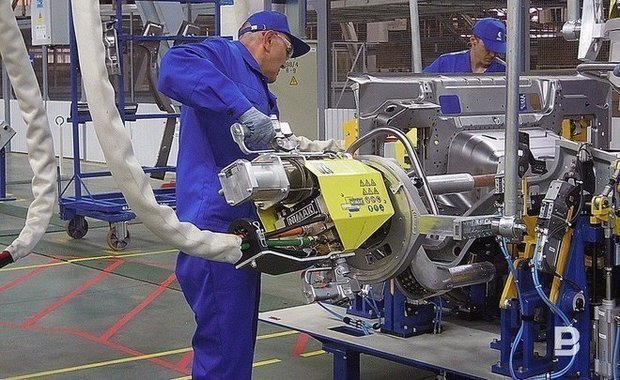Galina Akhmerova: ‘Human resources is the first thing investors ask the regions’
Labour market expert — about a new paradigm of working with colleges and universities at the request of employers

Most Russian industries are experiencing an acute shortage of workers, and a competitive struggle has developed for representatives of particularly scarce specialties. For example, at a recent meeting with the president of Russia, the head of Rostec, Sergey Chemezov, raised the problem of personnel shortage, saying that the concern “does not have enough people” and this year needs to close 23 thousand vacancies “urgently”. This issue requires the participation of employers themselves to help graduates, primarily in work adaptation, says Galina Akhmerova, the founder of Darwin Foundation for the Development of Accessibility of Modern Education and creator of Round platform. In the author's column for Realnoe Vremya, the expert discusses how companies interested in long-term development are increasing investments in human capital.
Personnel shortage in 42% of managers
Human capital is one of the key factors of socio-economic development of the country and its regions. In the last two years, its importance has also become the most important for Russian companies.
No wonder many people say that it is the cadres that are the “new oil” (and not artificial intelligence). Now the companies interested in long-term development are increasing investments in human capital.
How are things in reality? Personnel hunger continues to increase at industrial enterprises: 42% of managers indicated a shortage of employees, such results were shown by the latest survey of the Gaidar Institute. The question arises: is the interest in retaining employees caused to a greater extent by the need and inability to ensure employment?
To supply the industrial block of Russia with personnel, the federal project “Professionalism” has been developed, which gives the opportunity to become a highly qualified specialist at the leading enterprises of the regions. This was announced by Minister of Education Sergey Kravtsov within the framework of SPIEF 2023, which was held in St. Petersburg from June 14 to 17.

Companies and regions are actively discussing professionalism: market demands and regional opportunities.
Vladislav Shapsha, the governor of Kaluga Oblast, said that for the next 7 years they need 64 thousand specialists! At the same time, despite the active training of personnel, they remain in short supply.
Human resources is the first thing investors ask the regions.
“The companies themselves do not build relationships with future employees”
It is necessary to teach those who teach. To update knowledge regularly.
Chairman of the Committee on Secondary Vocational Education, Vocational Training and Vocational Guidance of the Russian Union of Industrialists and Entrepreneurs (RSPP) Andrey Komarov said that the share of targeted training is quite low. The problem of career guidance was also noted: it is necessary to start from school and give students the opportunity to see their way as early as possible. The companies themselves do not build relationships with future employees.
Assistant to the President of Russia Maxim Oreshkin agrees that the personnel forecast should be formed both at the federal level and at the level of each secondary vocational institution. And the secondary vocational institutions themselves should work with employers, combining global demands and working with motivation at the micro level. The college should not be excluded from the planning system, but a plan for the development of secondary vocational institutions is necessary for its correct operation.
The shortage of personnel is also observed in the construction industry. There are several hundred thousand employees missing, both engineering and working specialties!
Job fairs and excursions to production are not enough
The demographic pitfall covers all industries, not just those that have been around for a long time, like IT. Although complaints about the lack of skilled workers and programmers are most often heard today, in reality, the shortage of labour is universal. The number of vacancies has increased in almost all industries over the past three years. At the moment, competition between employers for an employee has already arisen in certain scarce working specialties.
The participation of employers themselves is required to help graduates, first of all, in labour adaptation. Here, the state is determined: the government is actively engaged in the revision of labour education.
Smooth integration into the workforce and acquaintance with the company from school will help to update students' knowledge and skills, and companies will more effectively close personnel issues. The old formats of work — job fairs, meetings and excursions — fulfill their role. But that's just not enough right now. One-time meetings/interactions or short practices
- they do not give an understanding of the essence of work in the organisation;
- they do not update the situation, and now changes in every area are happening rapidly;
- they do not give an idea of the necessary competencies;
- the coverage is cut by the number of participants.
Communicating with representatives of various universities and students, I often hear that events held by companies (hackathons, conferences, etc.) are not integrated into the educational process itself. What is not so interesting to the educational institution.
It is worth comparing it with the formulation of the Soviet system, where after completing training there was a distribution to jobs — the whole process was built from above. Now, with the development of market economy, it is necessary to understand and take into account the interests of all players: the state, educational institutions, companies, and, of course, individuals.
One of the ways of interaction between organisations and students can be, among other things, regular online communication. For example, we, at Round, help to establish such a connection between students and companies through:
- publishing case studies for a solution with real requests;
- seasonal festivals and competitions;
- native and correspondence acquaintance of students with the corporate culture of the company.
Thanks to such communication, the necessary competencies are also developed. And this situation is advantageous for both sides.
After all, the most important thing is that in the pursuit of making the “brightest, largest and most creative” event, you need to hear the student's voice.
“Client-oriented state” is already heard in many government programmes, I hope that soon a person will be seen behind the staff (students) and a human-centered approach will take the lead and defeat the formal goal of “closing a vacancy”.
Reference
The author's opinion may not coincide with the position of the editorial board of Realnoe Vremya.